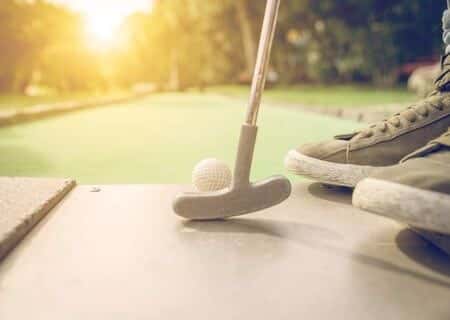Engineering Expert Witness Discusses Slip and Fall While Mini-Golfing
Updated on
Case Overview
This case involves a slip-and-fall accident at a mini-golf course. The plaintiff was playing mini-golf at a large course. Twenty minutes prior to the plaintiff’s arrival, it had rained heavily, but no warnings were provided to the plaintiff. Additionally, there were no warnings at particular holes regarding conditions that may be dangerous while golfing. Most of the surface at the different holes was comprised of an astroturf, which would become slippery when wet. At the hole in question, the player was expected to hit the ball up a hill, where it flattened out, only to have another hill, and then proceed to the hole. In the space between the two hills, there was a large triangle object which acted as a hazard. The plaintiff struck his ball, but it stopped in the area between the two hills. As the plaintiff went to hit his second stroke, he slipped on the incline in between the hills, and made contact with the triangle hazard. Subsequently, the plaintiff sustained a broken wrist and a concussion.
Questions to the Accident Reconstruction expert and their responses
How should a mini-golf course react after it rains, and what safety measures should be taken?
The mini-golf course should have, at the very least, warned the patrons about the dangerous conditions. Before allowing golfers to play the course, the supervisor/owner should have examined the course, looking for any dangerous circumstances that could lead to an injury. A majority of the golf course standards in ASTM involve the construction materials of golf courses. ASTM F 1637, Standard Practice for Safe Walking Surfaces would require the foreseeable walkway surface (the playing surface) to be slip resistant at the time of the incident. If they allowed the plaintiff to play on a slippery surface, that would be a problem. Also, the hazard needs to be placed as to foreseeable safety issues. Generally, there are a number of factors that need to be considered given the facts of this case. For surfaces like astroturf, especially if there is an incline/decline, precipitation can lead to dangerous conditions.
About the expert
This expert is a certified engineer with extensive experience investigating slip/trip and fall cases. He holds a Bachelor's and Master's degree in mechanical engineering and worked at top engineering firm, Pratt & Whitney. He has worked as an engineer for over 15 years and is highly qualified to review this case.

E-006971
Specialties:
Subscribe to our newsletter
Join our newsletter to stay up to date on legal news, insights and product updates from Expert Institute.
Sign up nowFind an expert witness near you
What State is your case in?
Subscribe to our newsletter
Join our newsletter to stay up to date on legal news, insights and product updates from Expert Institute.


